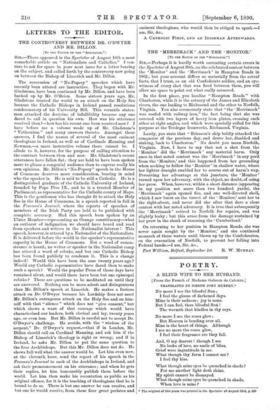THE MERRIMACK ' AND THE MONITOR.'
[To THE EDITOR OF THE "SPECTATOR."] SIR,—Perhaps it is hardly worth correcting certain errors in the Spectator of August 30th, on the celebrated contest between the Monitor' and the Merrimack' in Hampton Roads in 1862 ; but your account differs so materially from the actual facts, that I trust, as an old Confederate soldier, and an eye- witness of every shot that was fired between them, you will allow me space to point out what really occurred.
In the first place, you localise " Hampton Roads " with Charleston, while it is the estuary of the James and Elizabeth rivers, the one leading to Richmond and the other to Norfolk, Virginia. You also erroneously state that " the Merrimack' was roofed with railway iron," the fact being that she was covered with two layers of heavy iron plates, crossing each other at right angles, and which were specially rolled for this purpose at the Tredegar Ironworks, Richmond, Virginia.
Lastly, you state that " Ericsson's ship boldly attacked the conqueror of the previous day, and drove her, disabled and sinking, back to Charleston." No doubt you mean Norfolk, Virginia. Now, I have to say that not a shot from the `Monitor' did the `Merrimack' any material harm. Only once in that noted contest was the Merrimack' in any peril from the Monitor,' and this happened from her grounding when seeking to follow the Monitor' in shallow water, where her lighter draught enabled her to course out of harm's way. Perceiving her advantage at this juncture, the `Monitor' turned upon her adversary, with the object, no doubt, of using her prow. When, however, within a short distance (appearing in my position not more than two hundred yards), the Merrimack' again opened fire, and one well-directed shell, which I saw burst on the turret of the Monitor,' sent her to the right-about, and never did she after that dare a close contest with her noted adversary. It is true that subsequently the Merrimack' retired to Norfolk for repairs, and was slightly leaky ; but this arose from the damage sustained by her prow in the shock of ramming the Cumberland.'
On returning to her position in Hampton Roads, she was never again sought by the Monitor,' and she continued monarch of those waters until blown up by the Confederates, on the evacuation of Norfolk, to prevent her falling into Federal hands.—I am, Sir, &c.,
Fort William, Belfast, September 1st. R. W. MURRAY.


































 Previous page
Previous page